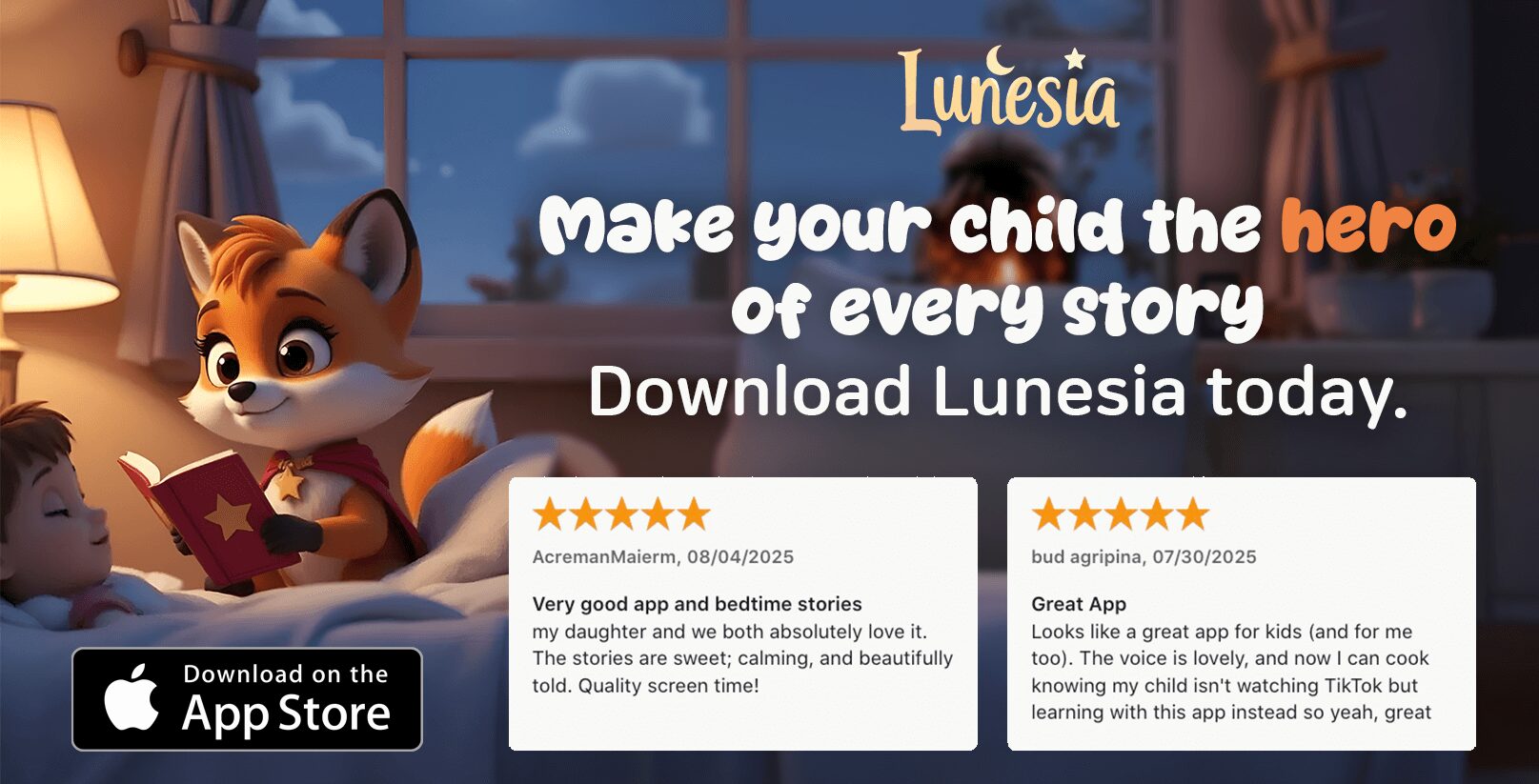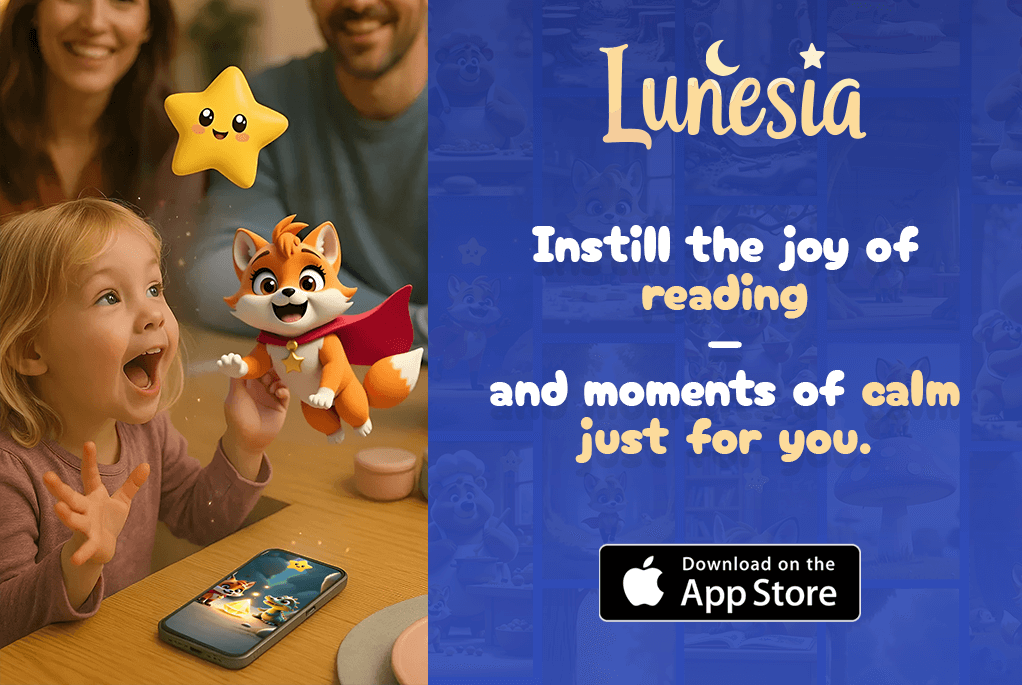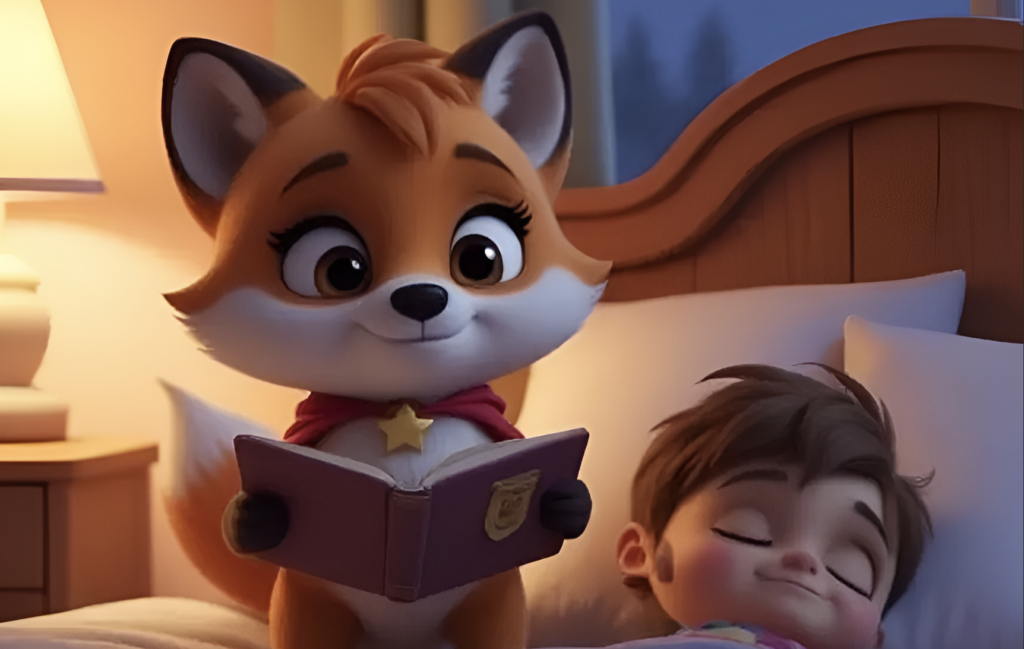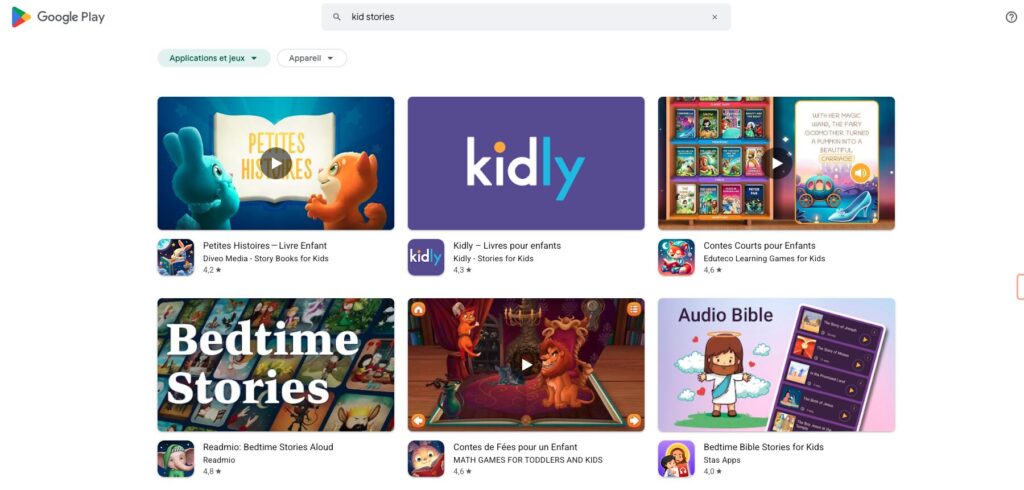As a mom and educator, I’ve spent countless hours searching for the perfect app to help my little one develop crucial emotional skills. I’m excited to share my findings with you! Teaching empathy to kids is essential for their social and emotional development.
In this comparison, I’ll explore how two popular apps approach teaching empathy to 3-year-olds. Both claim to boost emotional intelligence in toddlers, but they use different methods that might work better depending on your child’s learning style and interests.
By examining their unique features and educational methods, you’ll be able to make an informed decision about which app is best for your child’s emotional development.
Understanding Empathy Apps for Toddlers
Teaching empathy to toddlers is a vital aspect of their emotional development, and digital tools can play a significant role. At this age, children are beginning to understand and navigate their emotions and the feelings of others.
Empathy apps are designed to support this development by providing interactive and engaging experiences. For instance, apps like Peppy Pals help kids identify their emotions as well as recognize and respond to them in others, developing healthy social-emotional skills.
Why Emotional Intelligence Matters at Age 3
At age 3, a child’s brain is developing rapidly, creating crucial neural pathways that will shape their emotional intelligence for years to come. Introducing empathy concepts now can have a powerful impact on their ability to understand and manage their feelings and those of others.
How Digital Tools Can Support Empathy Development
Digital tools, such as empathy-focused apps, offer a unique advantage by creating safe environments where children can practice recognizing feelings and responding appropriately. These apps present emotional scenarios through engaging characters and stories that 3-year-olds can relate to, making learning fun and effective.
Peppy Pals: Overview and Key Features
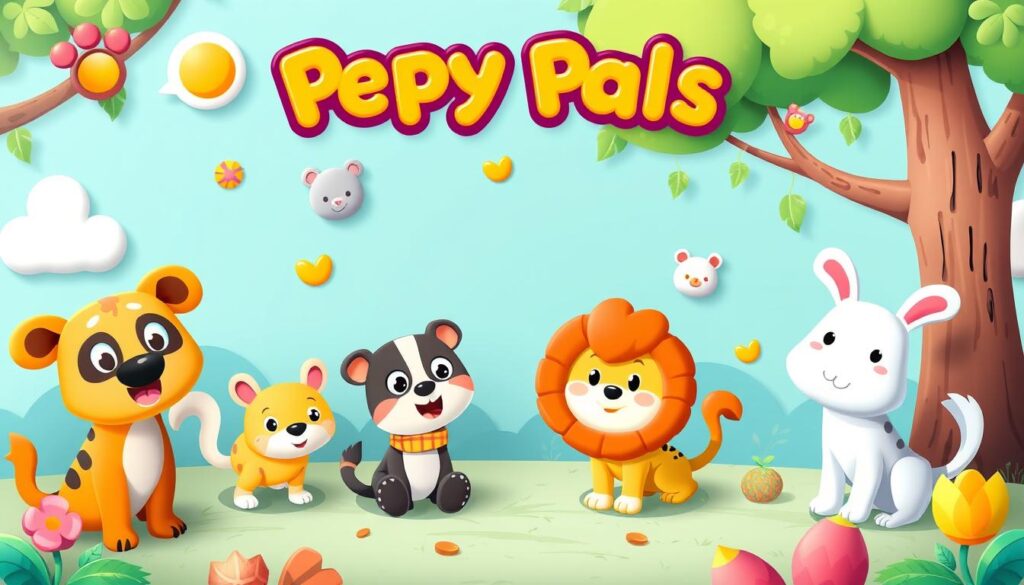
Exploring the Peppy Pals app reveals a treasure trove of features designed to teach empathy to toddlers. The app is designed for young children, offering a range of engaging content.
Animal Characters and Storylines
Peppy Pals features five animal characters, each with a unique personality that kids can easily recognize and relate to. The storylines are designed to model positive social interactions, showing how these animal friends help each other through everyday challenges.
Interactive Elements and Activities
The app includes a variety of interactive elements such as stories, videos, and games. Activities range from helping animals cross bridges to sharing treats, all designed to illustrate empathy in action through scenarios that 3-year-olds can understand.
Parent Involvement Features
Peppy Pals also offers parent involvement features, including discussion suggestions that help parents connect the app’s scenarios to real situations their child is experiencing. Parents can set the language to English or Swedish and access support materials in the parents’ section.
The free download includes limited content, with additional content available through an in-app purchase ($10.99). This structure allows parents to try the app before committing to the full version.
Lunesia vs Peppy Pals: Content Comparison
The content comparison between Lunesia and Peppy Pals reveals distinct approaches to teaching empathy. Both apps aim to help kids explore emotions and feelings, but they differ in their methods.
Age-Appropriate Design Elements
Peppy Pals uses wordless stories with quirky characters, making it perfect for pre-readers. In contrast, Lunesia incorporates more verbal guidance. The design elements in both apps are tailored to 3-year-olds, ensuring an engaging experience.
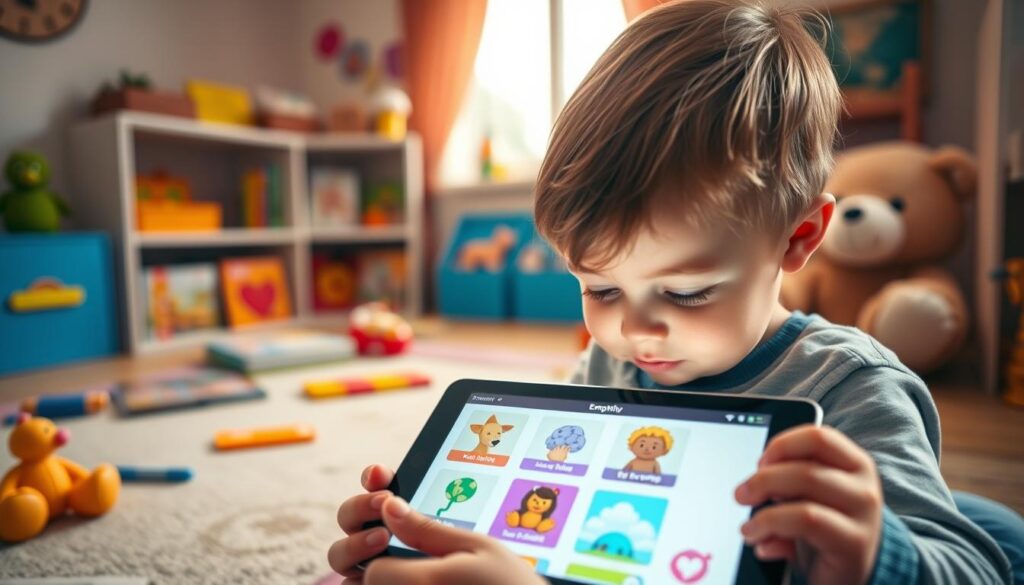
Teaching Methods and Approaches
The teaching methods differ significantly between the two apps. Peppy Pals focuses on observation and modeling of positive behaviors, while Lunesia incorporates interactive decision-making. This difference in approach can impact how effectively kids learn empathy.
- Peppy Pals excels with its visual approach, using expressive animal characters.
- Lunesia offers structured learning paths with progressive difficulty levels.
- Both apps balance entertainment with education, keeping kids engaged.
Lunesia: Overview and Key Features

Lunesia offers a unique approach to developing emotional intelligence in kids. This innovative app is designed to teach empathy through thoughtfully designed characters and storylines.
Character Design and Storylines
Lunesia’s characters represent different emotional states and personality types, making it relatable for 3-year-olds. The storylines present common childhood scenarios where empathy is needed, such as sharing toys or helping a sad friend.
Interactive Elements and Activities
The app’s adaptive interactive elements respond to your child’s choices, creating a personalized learning experience. Various activities target different aspects of emotional intelligence, from identifying feelings to practicing responses.
Parent Involvement Features
The parent dashboard provides detailed insights into your child’s progress, highlighting mastered concepts and areas needing attention. The parent guide offers practical suggestions for extending learning beyond screen time.
Usability and Child Engagement
When it comes to teaching empathy to 3-year-olds, the usability of an app is just as important as its content. For young children, an intuitive interface is crucial.
Interface Design and Navigation
Peppy Pals uses visual cues, while Lunesia combines visuals with gentle voice prompts to guide interaction. However, Peppy Pals sometimes lacks clear direction, potentially causing confusion. Loading times can be long, testing a toddler’s patience.
Keeping 3-Year-Olds Interested
Both apps use bright colors and animations to keep kids engaged. Lunesia’s clear beginnings and endings to activities help maintain focus. Providing tips on navigating these apps can improve a child’s experience. Reward systems celebrating emotional learning milestones also enhance engagement.
Educational Value Assessment
As a parent and educator, I’ve evaluated the educational value of various apps designed to foster empathy in toddlers. The key lies in how effectively these apps translate emotional concepts into genuine understanding for young children.
Developing Emotional Intelligence
Peppy Pals excels at teaching kids about different emotional reactions to the same situation, a fundamental concept in developing empathy. The app helps children identify and understand various emotions, laying the groundwork for more sophisticated emotional vocabulary.
Applying Skills in Real Life
The real test of any educational app is whether the skills learned transfer to real-world situations. Both Peppy Pals and Lunesia attempt to bridge this gap, but with different approaches. For instance, Peppy Pals uses visual storytelling to teach social-emotional skills, while Lunesia incorporates more verbal elements to support language development.
| App Feature | Peppy Pals | Lunesia |
|---|---|---|
| Emotional Intelligence Development | Uses animal characters to demonstrate different emotional reactions | Focuses on character design and storylines to teach empathy |
| Real-World Application | Encourages kids to apply lessons through accompanying questions | Uses interactive elements to reinforce emotional intelligence concepts |
| Language Development | Rely on visual storytelling without words | Incorporates verbal elements to support language skills |
By using these apps, kids can develop essential social-emotional skills, including identifying emotions and responding appropriately to others. As an educator and parent, I’ve seen firsthand how these skills can be applied in real-life situations, making these apps valuable tools in a child’s emotional education.
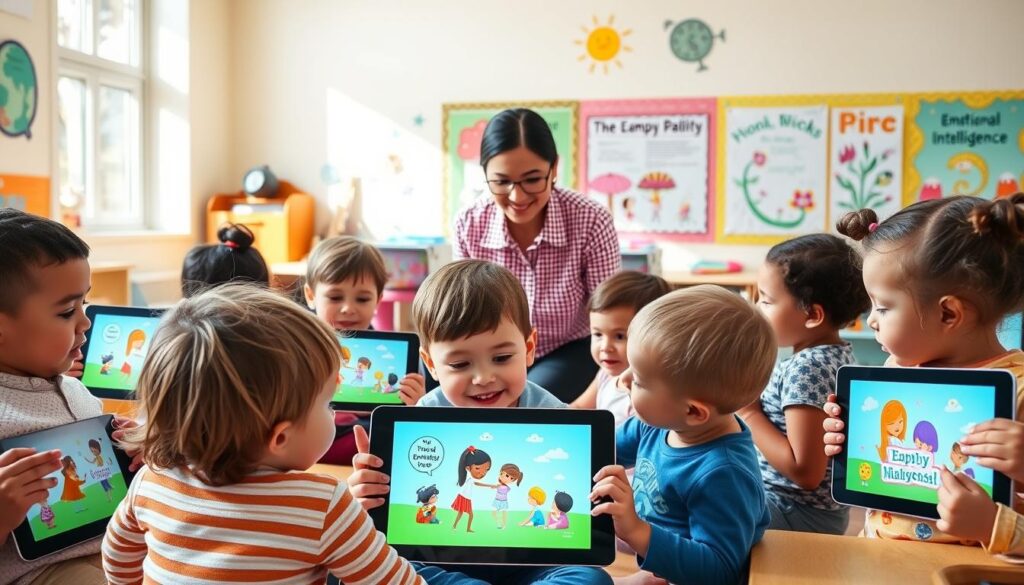
Price and Value Comparison
Empathy apps like Lunesia and Peppy Pals offer different pricing structures; here’s what that means for you. When evaluating these apps for your kids, it’s essential to consider not just the initial download cost, but the overall value they provide in teaching empathy through engaging games and relevant content.
Pricing Models and Free Content
Peppy Pals offers a free download with limited content, allowing parents to try before they buy the full version for $10.99. In contrast, Lunesia operates on a monthly subscription model, providing regular updates with fresh content. Both apps offer parent guide materials that significantly enhance their value.
Long-Term Value for Child Development
When considering long-term value, it’s crucial to look at how each app grows with your child. The best empathy apps for kids offer content that remains relevant as their emotional understanding becomes more sophisticated. The games included are designed to be replayed, reinforcing important concepts and increasing their value over time. For tech-conscious parents, both apps work offline after the initial download, an important feature for households with limited internet access.
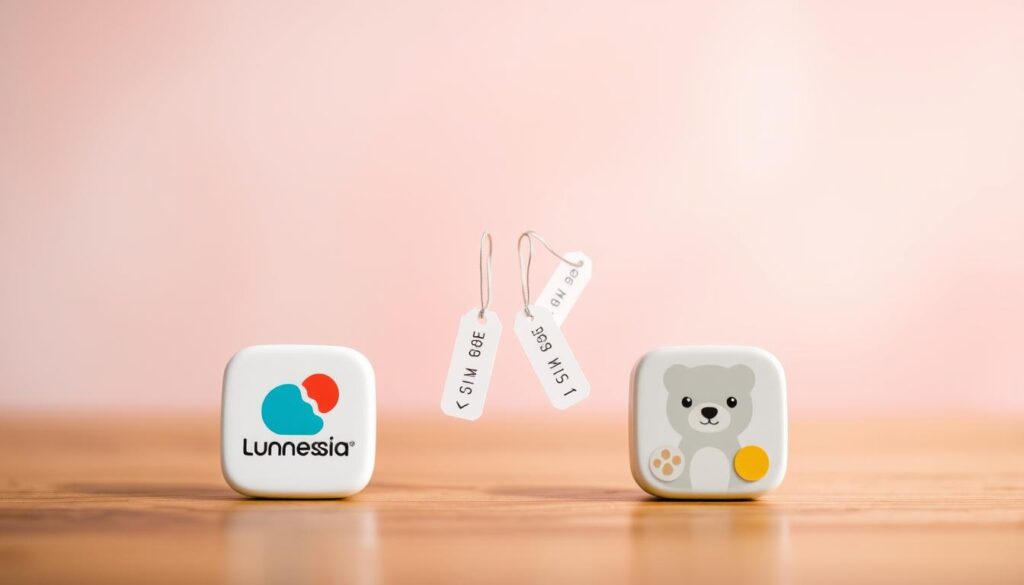
Conclusion: Which App Is Right for Your 3-Year-Old?
In the end, the decision between Lunesia and Peppy Pals depends on your child’s individual needs and learning style. If your child responds well to visual storytelling, Peppy Pals might be the perfect match. For those who benefit from structured learning, Lunesia‘s guided approach could be more effective. Consider your child’s communication skills and learning preferences when choosing. Both apps offer valuable empathy-building activities and parent guides. Start with the free versions to see which one captures your child’s interest!
FAQ
How do empathy-building apps like Peppy Pals support emotional intelligence in toddlers?
These apps use engaging characters and storylines to teach children about different emotions and how to manage them, promoting healthy emotional development.
What role do parents play in their child’s empathy development when using digital tools?
Parents can enhance their child’s learning experience by actively participating in the app’s activities, discussing the content, and reinforcing the lessons learned.
Are empathy apps suitable for all 3-year-olds, or are there specific requirements?
While these apps are generally designed for young children, it’s essential to review the content and features to ensure they align with your child’s individual needs and maturity level.
How can I assess the effectiveness of an empathy-building app for my child?
Look for apps that offer a mix of interactive elements, engaging storylines, and progress tracking features, which can help you understand your child’s development and adjust the app’s usage accordingly.
Can empathy apps be used as a replacement for human interaction and guidance?
No, these apps should be used as a supplement to, not a replacement for, human interaction and guidance. They are most effective when used in conjunction with parental involvement and real-world experiences.
What are some key features to look for when choosing an empathy-building app for my 3-year-old?
Consider apps with relatable characters, interactive activities, and features that encourage communication and language development, as these can help foster a deeper understanding of emotions and empathy.

